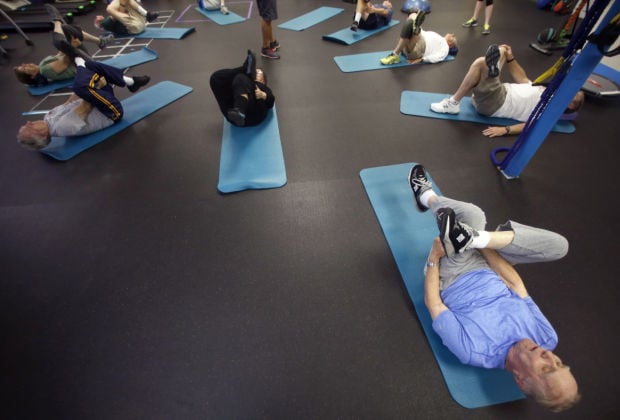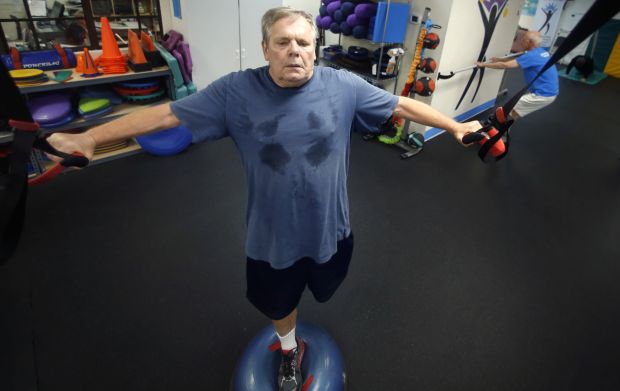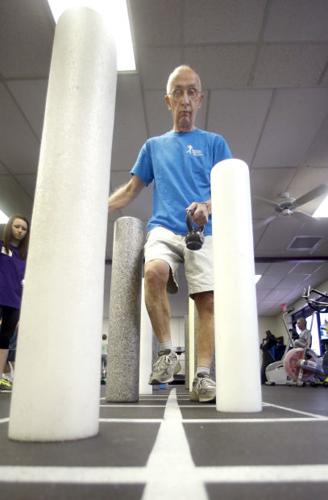A little more than two years have passed since a small gym, sandwiched between a church and discount grocery store on West Fort Lowell Road, opened for people with Parkinson’s disease.
What began with only 40 members has since expanded to 100. And the need is growing.
Close to 250 people a year are newly diagnosed with Parkinson’s in Tucson alone. In the U.S. there are 50,000 to 60,000 new cases of Parkinson’s diagnosed annually, according to the National Parkinson Foundation.
“We are maximized out on space. We have no office space and no physical space,” said Becky Farley, CEO and founder of the Parkinson Wellness Recovery Gym — or PWR!Gym — and CEO of Parkinson Wellness Recovery, a nonprofit that sponsors the gym. “There’s such more need than we’re serving.”
Farley said she hopes to expand the gym, at 134 W. Fort Lowell Road, with more programs and staff by Sept. 1 and double the space to develop outreach and train other instructors in Southern Arizona.
Before Farley opened the gym, she developed a therapy program for those with Parkinson’s disease. However, she soon realized therapy wasn’t enough and she needed to develop a comprehensive approach.
The exercises focus on big and fast movements and on improving function. Challenges for those with Parkinson’s include getting out of a chair and standing up from the floor, and the purpose of the gym is to help members practice these skills as well as other coordinated movements.
The gym also provides physical therapy and consultations for people with Parkinson’s.
It’s $75 a month for a gym membership.
Farley said the gym has people from all over the U.S. and Canada coming to get help — and dozens of people from here and elsewhere have gone there to have a physical therapist develop a home exercise regimen for them.
Farley eventually hopes PWR gyms will open all over the country.
“People don’t know how much they can do, so you’ve got to put them in those situations where they discover it,” she said. “We provide more than just the exercise — we try to provide them with a lot of education and a lot of empowerment.”
Tim Bowden, a professor emeritus of cellular and molecular medicine at the University of Arizona, was diagnosed with Parkinson’s disease seven years ago and began physical therapy with Farley shortly after. He credits the gym for his ability to continue the activities he loves.
“I think it shows that people with Parkinson’s can be physically active and can do challenging things with training and appropriate exercise programs,” he said. “I don’t think I could have done this without the gym training.”
For the past four years, Bowden and his wife Diane have been working to raise funds for the gym through their Bowden PWR Hike. The money from the hike helps fund the group classes and is the only official source of fundraising, Farley said.
This year’s April hike is different in that there are three distances offered for participants: a 1-mile, 4-mile and 10-mile hike at Catalina State Park. Also this year more of the participants have Parkinson’s.
Nathaniel McMullen, professor emeritus of cellular and molecular medicine at the UA, was diagnosed with Parkinson’s in 2011 and joined the gym shortly thereafter. McMullen is participating in the 4-mile PWR Hike and said he hopes it will result in increased funding for the gym.
McMullen said the gym has helped provide him power over Parkinson’s.
“I think the biggest benefit is the feeling of control over the disease,” he said. “I don’t have to passively accept it and its limitations and its effects on my behavior. I can actually actively participate in combating the disease and degeneration of my motor system. It’s a very positive influence over my life. ”
Brittny Mejia is a University of Arizona journalism student who is an apprentice at the Star. Contact her at starapprentice@azstarnet.com






